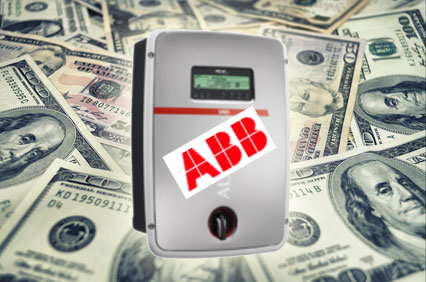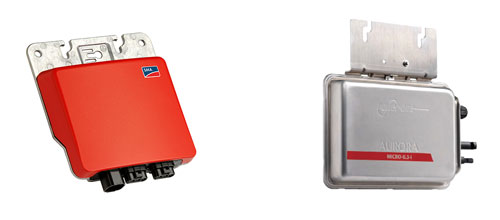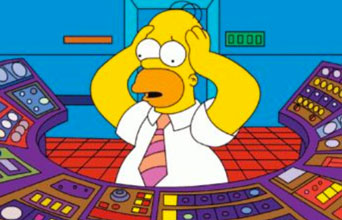I’m a big fan of Aurora inverters. These thoroughbred Italian inverters are manufactured by a company called Power-One and are the second best selling inverters on the planet. (The best selling are SMA in case you didn’t know)
So news of Power-One being sold, lock, stock and barrel to Swiss engineering conglomerate ABB, made me sit up and take notice.
Why?
Two reasons:
1) Aurora inverters could overtake SMA as the #1 solar inverter brand
ABB is freaking huge. How huge? Like 145,000 employees huge. They paid cash for the Aurora Inverter manufacturer and I dare say they will be willing to invest what ever it takes to grow their new baby into the dominant Solar Inverter manufacturer on the planet. SMA should be afraid. Very afraid.
I love SMA inverters, but I think SMA have got pretty complacent at the top. My evidence for this is their much delayed micro inverter product. They claim to have one (see pic below). But it’s not on the market yet – and I just get the feeling that they don’t really believe that microinverters are an important market for them. Meanwhile the Power-One Aurora micro inverter is on the market (and looks bloody awesome from the specs!).
I would humbly suggest that the CEO of SMA reads a book called The Innovator’s Dilemma if he hasn’t already. The CEO of Intel read it about 10 years ago and credits it with saving his company. Too often, big companies fail because they don’t see the next innovation in the market coming, or if they do – they make a half assed attempt to have a similar product, whilst their competitors, or a newcomer, go all in.
I am convinced that in 3 years microinverters will make up the majority of the residential market for solar inverters. And I think that could really hurt SMA, whilst rewarding inverter manufacturers like Power-One that appear to have embraced all things micro and have the deep pockets needed to market them hard.
(Of course the ABB bureaucracy may not give priority to the Aurora Microinverter product – in which case all bets are off!)
2) ABB can write some of the best and most reliable control software in the world.
Not a lot of people know this, but I used to design control systems for nuclear power plants.
I used ABB software and hardware on some of those projects, and the quality and reliability of the software was incredible. Which is kind of reassuring if you live next to one of the nuke plants running my code!
Anyway, ABB have a software product called 800XA which, in my professional opinion, is the best control and monitoring software you can get. Compare the quality of the ABB gear with the software you get bundled with a typical solar inverter or micro inverter, and the ABB stuff is a different class altogether.
What has this got to do with solar inverters?
Everything!
I expect that Aurora inverters will soon set the gold standard for reliability in the solar industry.
A study of 333 solar systems in the US¹ found that 69% of system failures were due to the inverter failing. And 48% of those failures were due to control software failures.
That’s shocking!
If ABB want to make their inverters more reliable than SMA’s then they need to make the inverter software bulletproof. If they take their best software guys and get them to overhaul the inverter software, they will get there, I’m sure.
But wait, there’s more good news on the software front:
Microinverters make good, reliable monitoring software absolutely critical for any inverter manufacturer
As mentioned earlier, I reckon microinverters are the future. But the thing about microinverters is that, because they let you monitor every panel individually, they need really good monitoring software. Microinverter owners tend to spend waaaaay too much time monitoring their panels’ performance. Why? Because they can!
If the monitoring software is bad, the technical support burden for solar installers will be horrendous. And all the microinverter monitoring software I have seen is pretty flakey to tell you the truth! (which is why many of the big installers won’t touch them)
ABB have got what it takes to start again from scratch and create monitoring software that is bulletproof. Like their nuke plant monitoring software is (thankfully).
They also know a thing or two about automated monitoring systems, so expect their software to monitor your panels for you and automatically hassle your installer if a panel is not performing as well as it should. This will be a standard feature very soon. Trust me.
Also ABB have the resources to write the code that can join hundereds of thousands of PV systems together in the cloud to create virtual power stations that sell their aggregated power direct to the grid! But that’s another story for another post.
If none of the above happens after the sale, then my predictions are complete BS. It won’t be the first time!
But whatever happens in the next couple of years, one thing is certain. One of the worlds biggest and most respected engineering companies has invested a billion bucks in solar. This can only improve confidence in the solar industry. Which in the light of solar panel manufacturers going bust left, right, and centre can only be a good thing!
If you want to see what customers think, we have heaps of ABB inverter reviews here.
References:
(1) PV system reliability – lessons learned from a fleet of 333 systems” | A. Kaushika, A.Golnasb




 RSS - Posts
RSS - Posts



Hi Finn,
Great article however I don’t believe ABB can get there stuff together to make it number one, I just look at some of their other acquisitions like Fischer & Porter / Hartmann & Braunn whose market share was diluted when it changed hands.
As for the 800xa I believe you are incorrect here as well, there is no doubt that it is good product but for reliability I don’t think it has a patch on Emerson DeltaV,Yokogawa Centum and the Honeywell offering. Take a look at the oil and gas industry where absolute reliability is required and you will see that these three are the leaders. I would even hazard a guess that ABB wouldn’t get a control system in at a new nuclear plant.
Lets hope ABB create serious inroads as this will drive competition and ultimately better products for the consumer.
Brad
Here we are, just about 2.5 years on and micro inverters are still nothing. I had hoped they might be, but long expected they’d never get the traction, I don’t think they will. At least not for another 3 years, if ever.
Brad might be right about Yokogawa and Honeywell too.
But the ABB inverter seems unchanged from the old PowerOne unit, while still a great product, no leaps forward??!! I’d love to hear what’s changed for the better and be proven wrong?
Thoughts Finn?
Hi Rob,
Enphase had almost 40% of the US market in 2014 (Source: GTM Research U.S. PV Leaderboard, Q2 2014).
I’d call that traction coming from 0% a couple of years ago.
Cheers,
Finn
Wasn’t aware of that, that’s a huge increase, fantastic. How’s the Aussie market looking for this style of inverter? Do you see it becoming the norm here.
I’ve been reading your blogs with interest, but note there is no mention of the Sth Australian solar panel manufacturer – Tindo. There were recommended to me, and I’d like to support Australian. Is there anything i should be aware of?
Tindo are great panels. I have 24 on my roof and they work very well. You do pay a premium for them – but the quality is great.
But I understand they are not Tier 1 panels – yes/no?
A local solar group who are providing me with a quote say they will not use them because the support they receive from the Sth Aust and Federal Govt’s is not future-guaranteed, and in any case are not on the current list of Tier 1 panels.
David
That’s correct – to be a Tier 1 manufacturer you have to be a lot bigger than Tindo. But just because a panel is not Tier 1, it does not mean it is poor quality. Insisting on Tier 1 is a very useful way to improve your chances of getting a good panel and avoiding the junk if you don’t have good independent information about the quality of certain brands. I know the guys that run the factory, I’ve seen the production line and quality control and inspected the build quality of the panels, and Tindo are one of the few non-Tier 1 panels that I can happily recommend.